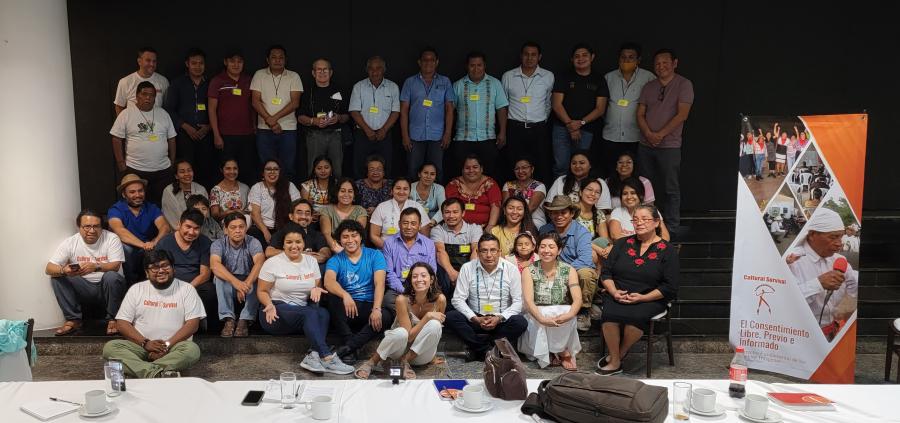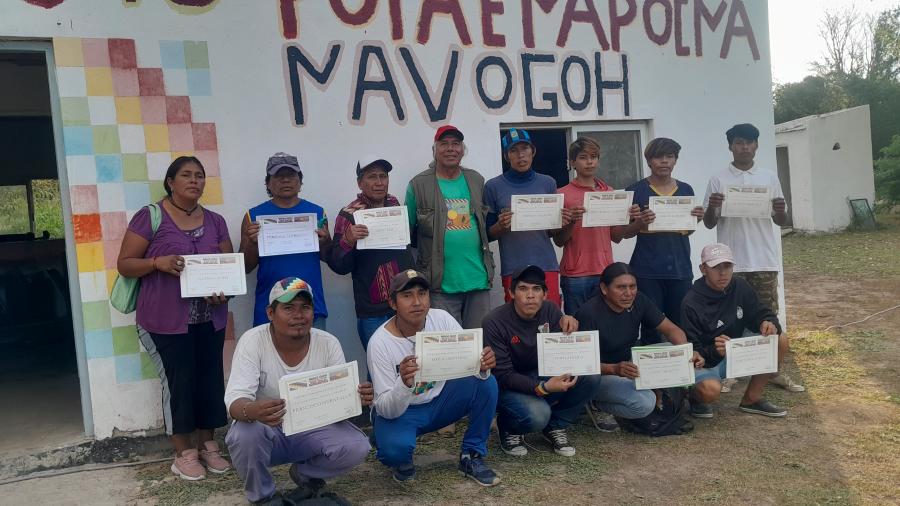Since January 1, 1994, the Chiapas rebellion has been predominantly a marathon of various negotiations. Most recently, the negotiations between the Mexican government and Zapatista rebels revolve around legal issues. In Mexico, indigenous groups lobby to be legally recognized as a distinct ethnic and cultural component of the nation. However, it is not evident by reading the text of the constitution that Mexico is a multiethnic country. Unlike the fundamental laws of other countries in Latin America, Mexico's past Constitution consistently lacked any references to indigenous peoples. With the national and international attention generated by the rebellion, the chances for a new "ethnic law" in Mexico are better than ever.
Mexico's Legal Tradition
Not until 1992 was an additional paragraph to Article 4 of the Constitution amended that included notions of "Mexico's pluricultural composition originally based on its indigenous peoples." The paragraph states that the "law shall protect and promote the development of their languages, cultures, customs, resources, and specific forms of social organization." Evidently, this change was not due to a human rights focus in president Salinas' political philosophy, but rather in response to demands from indigenous groups and mounting political pressure. Five years later, however, the corresponding legislation (Ley Reglementaria) has not been implemented, indicating that the political will for real reforms is lacking. This is paradoxical considering that Mexico is the country with the largest indigenous population ( 10-15 million) in the hemisphere, and furthermore, publicly celebrates the importance, richness, and amazing accomplishments of its ancient indigenous peoples.
Some scholars explain this exceptional situation with the tradition of Mexico's legal system. Contrary to United States law which legally treated Native Americans as non-citizens but fenced them in reservations and designed a unique set of legal norms, Mexican law has always been "ethnically blind." This was due to the alleged equality of all citizens. Indians in Mexico are legally treated (in theory) exactly as any other Mexican. However, San Diego Law professor Jorge Vargas states that there is a "tremendous gulf" regarding the individual guarantees and human rights of Indians, in comparison with the manner in which these theoretical guarantees and rights are enforced by judges, authorities, or government officials. According to Vargas, a second explanation for the continuous delay in the implementation of the amendment is the lack of available information which accurately describes, explains and analyzes the legal traditions and customs of the indigenous peoples of Mexico. Traditionally, Mexican legal scholars have been more attracted to research on the ancient indigenous civilizations, while neglecting the research necessary for implementing the Ley Reglementaria.
A Legal Revolution?
Vargas concludes that the total amount of recent changes in Mexico's legal system has had such profound and varied social impacts that they constitute a "legal revolution." Salinas' amendments to the Constitution's Article 27 in 1992, for example, brought drastic changes for indigenous and small-scale farmers: individual property on the ejidos (communally controlled pieces of land) is now permitted, and ejidatarios are allowed to enter into commercial ventures with national or foreign corporations. For the Salinas administration, the situation of indigenous peoples was clearly not a priority when they introduced the changes. The main reasoning behind those reforms was that in preparation of NAFTA, the modernization of the countryside had to be initiated. Mexico saw an "Americanization" of its law by successfully implementing neoliberalism into the legal system. Vargas states "In only seven years (1988-1995), the most basic foundations of Mexico's legal institutions were not only changed, but deeply transformed in their economic and philosophical tenets. Mexico is now moving vigorously towards privatization, deregulation, minimization of governmental structure, and the promotion and fostering of foreign investment."
Indigenous Peoples Remain Skeptics
From a legal point of view, there is little doubt that the efforts by Mexico's technocrats relieved the Mexican legal system of many of its chronic problems related to bureaucracy and inefficiency However, the Salinas government clearly produced an increase in political, economic, and legal corruption and further extended the crisis of political legitimization of the ruling PRI (Revolutionary Institutional Party). Particularly, the corruption of the PRI and the economic liberalism of the Salinas administration (including NAFTA) were the main problems for indigenous and other opposition groups. These groups now call for a revision of the recent legal changes and demand new reforms in ethnic law. Among their priorities are the final implementation of the amendment to Article 4, a revision of agrarian reforms, and indigenous self-determination, a fundamental principle of international law.
Crisis and Confusion in Approving New Indigenous Rights Bill
After over two years of negotiations between indigenous representatives and government officials, in December 1996 both parties seemed ready to approve a new indigenous rights bill to be sent to Congress. However, the process was delayed as government negotiators tried to change the content of the bill at the last moment. The Zapatista National Liberation Army (EZLN) previously approved the proposed bill designed by the Congressional Commission for Agreement and Peace (COCOPA) and was awaiting a `yes' or `no' response from the government. However, the government delegation turned in its response along with proposals for changes in the bill. The Zapatista delegation declined the changes and criticized the COCOPA for allowing this counter-proposal, after having decided before that no changes to the bill would be allowed by either side.
The peace process as a whole appeared to be endangered as President Zedillo asked the Zapatistas for more time in order to study the proposal more carefully Nevertheless, the Zapatistas agreed and Subcommandante Marcos implied that the confusion was due to the fact that the government delegation had misinformed Zedillo. Since December, with important elections approaching, Zedillo has repeatedly indicated his rejection of the COCOPA proposal because it would nurture the fragmentation of Mexico.
The proposed bill guaranteeing indigenous rights includes seven Constitutional reforms and grants indigenous people the autonomy to:
1. Implement their internal forms of social, economic, political and cultural organization;
2. Apply their own systems of internal regulation and conflict resolution;
3. Elect officials and decide upon a preferred form of internal governance according to their own norms, guaranteeing equal participation of women;
4. Collectively decide how to use the natural resources of their territory, with the exception of those that pertain directly to the state.
The Americanization of Mexican Law (including NAFTA) has affected indigenous peoples in Mexico in two ways. First, it has provided a further step towards the spread of neoliberalism and will most likely deteriorate the socio-economic situation of indigenous peoples in Mexico. But second, it has shown that it could serve as a catalyst for further domestic legal reform which eventually might help to improve the situation of indigenous peoples in Mexico. Hopefully, the legal changes necessitated by indigenous groups in Mexico will finally be implemented into Mexican Law. They are absolutely crucial for indigenous cultural and political survival. The alleged lack of empirical studies of legal traditions of indigenous communities in Mexico should not be abused to excuse the tardiness in implementing the amendment to Article 4 of the Constitution. There is evidence that indigenous groups face racism and discrimination, are denied basic rights, and are considered second-class people. Finally, even if legal changes are implemented, the longer and more demanding struggle will continue: the one for more tolerance and mutual understanding among all Mexicans.
References:
Anaya, S. James. 1996. Indigenous Peoples in International Law. New York: Oxford University Press.
Belous, Richard S., Jonathan Lemco (ed.). 1995. NAFTA as a Model of Development. Albany: SUNY Press.
Hannig, Mark. Spring 1996. "An Examination of the Possibility to Secure Intellectual Property Rights for Plant Genetic Resources Developed by Indigenous Peoples of the NAFTA States," in Arizona Journal of International and Comparative Law. p. 175-252.
Vargas, Jorge. 1994. "NAFTA, the Chiapas Rebellion, and The Emergence of Mexican Ethnic Law," in California Western International Law Journal. p.1.
Vargas, Jorge 1996. "Mexico's Legal Revolution," in Georgia Journal of International and Comparative Law. p.497.
Zamora, Stephen 1993. "The Americanization of Mexican Law: Non-Trade issues in the NAFTA," in Law and Policy in International Business. p.391.
Article copyright Cultural Survival, Inc.



